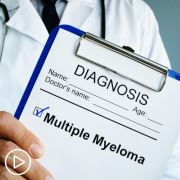What Can Newly Diagnosed Myeloma Patients Expect When Starting Treatment?
What Can Newly Diagnosed Myeloma Patients Expect When Starting Treatment? from Patient Empowerment Network on Vimeo.
As a newly diagnosed multiple myeloma patient, the thought of treatment can be overwhelming. Expert Dr. Rafael Fonseca shares insight about expectations when starting a new treatment, and what goals providers have in mind for patient care.
Dr. Rafael Fonseca is the interim director of Mayo Clinic Cancer Center and serves as the director for Innovation and Transformational Relationships at Mayo Clinic in Arizona. Learn more about Dr. Fonseca here.
Related Programs:

|

|

|
Transcript:
Katherine:
Dr. Fonseca, we have a question from a newly diagnosed myeloma patient. Barbara says, “I am just about to begin my first myeloma treatment. What can I expect?”
Dr. Fonseca:
I think if you start on treatment, first of all I hope they already went through a good description of what the treatments are, the frequency by which you’re going to have to go to the center, and also what are the toxicities to look out for.
One of the most common toxicities that we face and one of the most challenging parts of initial treatment is the use of steroids. So, we use dexamethasone as part of every single regimen we use for myeloma. I tell patients, “Dexamethasone is a simple drug at first glance, but it’s oftentimes the most complicated part of treatment.”
The human brain works at triple speed when you’re on dexamethasone. So, it’s hard to sometimes be able to sleep properly. People can become anxious and even the sweetest person in the world can become a little bit edgy on dexamethasone.
I always say Mother Teresa on dexamethasone would be an edgy person. Just be patient. Work with the team. Just know that on the other side of treatment there is a return to normal life.
Our goal as we embark on treatments and, for instance, is I see patients that are going to go through transplant, I tell them, “Our goal is you finish, you recover, and you go back to your life. You back to work. You go back to your family, your kids, your sports.” That’s really what we strive for when we treat patients with myeloma.










